Term Page
Family-Based 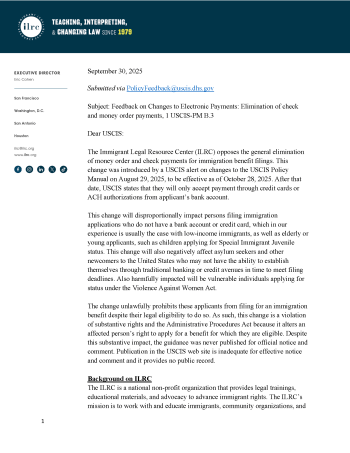
The Immigrant Legal Resource Center (ILRC) opposes the general elimination of money order and check payments for immigration benefit filings. This change was introduced by a USCIS alert on changes to the USCIS Policy Manual on August 29, 2025, to be effective as of October 28, 2025. The new guidance states that all applications filed October 28, 2025, or after must pay by ACH bank account payment, credit or debit card, or pre-paid card. No bank checks, certified checks, personal checks or money orders will be accepted thereafter.
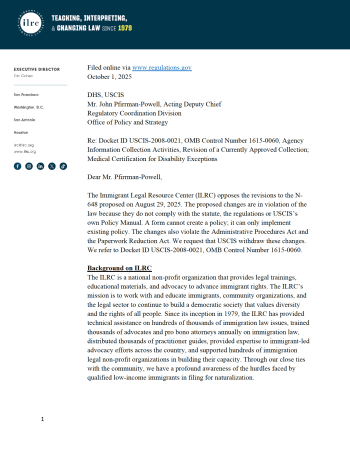
On September 30, 2025, ILRC submitted this comment to USCIS to oppose the proposed changes to the N-648 and request that they be withdrawn. The changes create a series of substantial obstacles for naturalization applicants applying for a disability waiver of the English/civics requirement. The proposed changes create a form more than twice the length (10 pp.) of the current form (just over 4 pp.) that creates an undue burden on applicants and the medical professional who must complete the N-648. It also doubles the burden of time for USCIS adjudicators who must review this form.
The barrier that these changes would pose is prejudicial to eligible waiver applicants. Standards expressed in the revised form are outside any guidance provided by the statute, regulations and USCIS Policy Manual. The form purports to create law and invents barriers to eligibility in areas where no such law has been established by legitimate guidance.
The barrier that these changes would pose is prejudicial to eligible waiver applicants. Standards expressed in the revised form are outside any guidance provided by the statute, regulations and USCIS Policy Manual. The form purports to create law and invents barriers to eligibility in areas where no such law has been established by legitimate guidance.
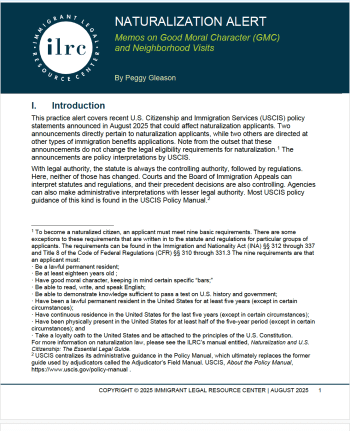
This practice alert covers recent U.S. Citizenship and Immigration Services (USCIS) policy statements announced in August 2025 that could affect naturalization applicants.
On July 28, 2025, the ILRC submitted a comment opposing a new government proposal to add extra questions to nine immigration forms, including applications for naturalization, asylum, and green cards.
On July 16, 2025, ILRC submitted a comment opposing a new U.S. Citizenship and Immigration Services (USCIS) policy that allows the agency to use “derogatory information” against immigration applicants without always disclosing it.
On May 2, 2025 the ILRC submitted a letter signed by 115 organizations has opposing a U.S. Citizenship and Immigration Services (USCIS) proposed rule to expand the information collected on immigration forms.
On May 2, 2025 the ILRC submitted a comment opposing a proposed U.S. Citizenship and Immigration Services (USCIS) rule that would expand the collection of personal information from immigration applicants.
On May 5, 2025 the ILRC submitted a comment opposing a proposed U.S. Citizenship and Immigration Services (USCIS) rule that would require immigrants to disclose their social media identifiers on application forms.
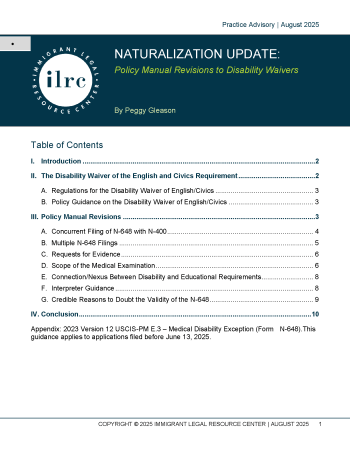
This practice advisory provides background on the disability waiver of the English and civics requirement for naturalization and describes the June 2025 revisions to the USCIS Policy Manual (PM) on the submission and review of disability waivers. The revised guidance in the PM applies to applications filed on or after the publication date of June 13, 2025. Overall, the PM revisions signal a change in tone that assumes fraud in the disability waiver process is frequent and encourages increased scrutiny by USCIS adjudicators.
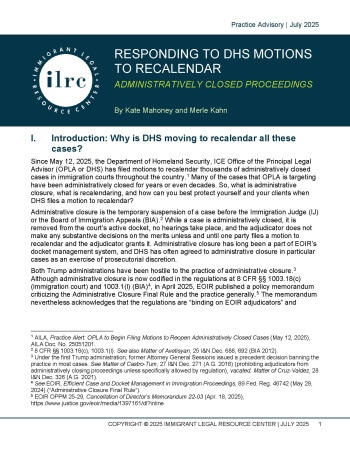
In recent months, the Department of Homeland Security has begun filing thousands of motions to recalendar administratively closed proceedings. This trend is raising questions about how attorneys and accredited representatives can respond to these motions and protect their clients’ interests, particularly in cases that have been administratively closed for many years. This advisory explores those questions and offers strategy considerations when determining how to proceed in each case.